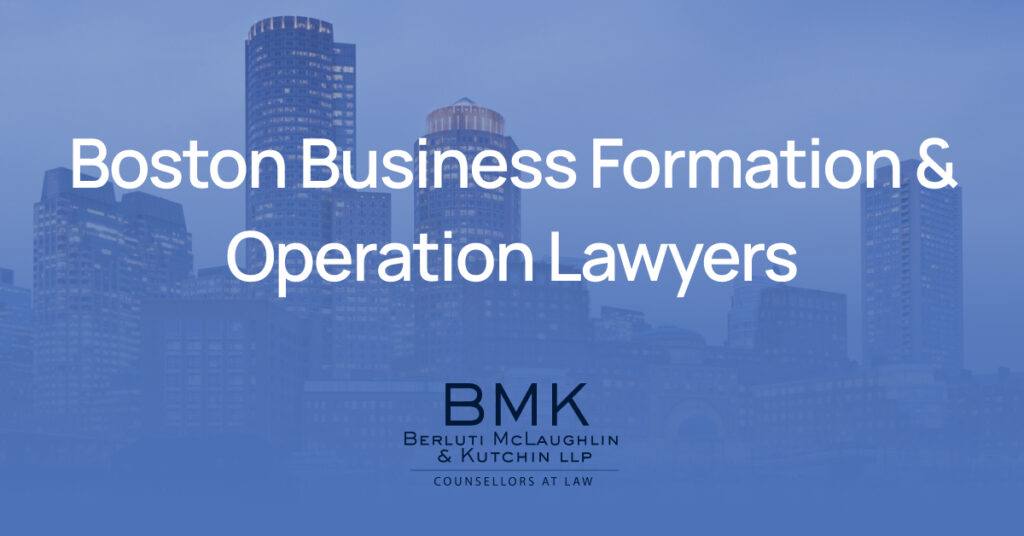
You have great ideas, and you want to use those ideas to start a great business. But you have to follow a lot of complex legal rules to get your business off the ground. That’s where the business formation attorney team at Berluti McLaughlin & Kutchin LLP (BMK) comes in. With over 200 years of combined experience, our award-winning law firm is here to help Boston entrepreneurs and business owners establish strong legal foundations for long-term success.
Forming a Business in Massachusetts
After having a great business idea, you have a big decision to make. You must determine which business structure is best for your needs.
You can quickly start a sole proprietorship on your own or a general partnership with a colleague. However, those business structures don’t come with many (or any) legal protections to shield your personal life from business trouble. So, many business owners in Massachusetts form corporations or limited liability companies (LLCs) to create separation between their personal and business liabilities.
Forming an LLC
LLCs are owned by members and run by managers. Depending on the LLC, the members and managers might be the same individuals. Typically, to form an LLC, you must:
- Designate a resident agent to receive legal documents for the LLC,
- File a certificate of organization with the Secretary of the Commonwealth of Massachusetts (secretary),
- Create an operating agreement outlining rules and rights for members and managers,
- Obtain an employer identification number (EIN) from the IRS, and
- Comply with state and local licensing requirements.
LLC owners must also file an annual report with the secretary. These rules can get complex, but our business formation lawyer can help you set up your enterprise correctly and keep it running smoothly.
Forming a Corporation
Shareholders have rights to the profits of a corporation, and officers and directors run a corporation. To form a corporation, you must:
- File articles of organization with the secretary;
- Appoint a board of directors and officers;
- Establish bylaws, shareholder agreements, and agreements of association;
- Obtain an EIN from the IRS;
- Issue shares and record initial corporate minutes;
- Hold annual meetings; and
- Maintain good standing with annual filings and fees.
BMK’s business formation attorney can help ensure you complete these steps accurately and efficiently, reducing the risk of errors that might delay your launch or expose you to liability.
Funding Your New Business
Securing capital is essential to getting your business up and running. You might fund your business through:
- Corporate stock sales,
- Private equity or venture capital,
- LLC member or corporate owner contributions,
- Outside investors, or
- Loans or credit lines.
Depending on the funding option you choose, you may open yourself to more liability or fewer management rights. Our business formation lawyers help draft funding agreements, comply with state and federal securities laws, and protect founders from dilution or loss of control.
Management Rights and Responsibilities
Understanding how your business is managed and who holds decision-making power is critical for long-term stability. If you don’t make management plans, the commonwealth’s default rules decide who has the management rights in your business.
But there’s good news: You can tailor management rules to your goals by executing business agreements. A BMK business formation lawyer can help craft enforceable bylaws, operating agreements, and other internal documents to reflect your preferred management structure. We can also draft documents to clarify rights, duties, and dispute resolution methods.
Transferring Ownership
As your business grows, you may bring on partners, sell equity, or plan for succession. Both corporations and LLCs allow for ownership transfers, but the mechanisms differ.
Corporations typically allow stock transfers, subject to restrictions in shareholder agreements, certain laws, or bylaws. LLCs may restrict or prohibit transfers without unanimous member consent. Our attorneys can prepare buy-sell agreements, right-of-first-refusal clauses, and succession plans to help ensure smooth transitions without disrupting operations.
Talk to a BMK Business Formation Attorney Today
At Berluti McLaughlin & Kutchin LLP, we blend deep legal knowledge with a practical understanding of business. For over 200 combined years, our business lawyers have helped Boston-area entrepreneurs to protect their investments and achieve their visions.
We don’t just file paperwork. We offer strategic guidance tailored to your industry, growth plan, and personal priorities. From your first idea to your first investor, our attorneys are here to help you succeed.
Contact BMK by phone or online today to schedule a consultation with an experienced attorney. We can help you start smart and stay strong.
Frequently Asked Questions
What Does a Business Formation Attorney Do?
A business formation lawyer helps you choose and establish the right business entity, draft foundational documents, secure financing, and comply with state and federal laws. They help prevent costly legal issues and set your business up for future growth.
When Should I Hire a Business Formation Lawyer?
In many cases, hiring a lawyer as soon as you decide to start a business is the best way to go. Early attorney involvement helps ensure your business has the best structure from the start, which may save you time and money down the line.
Why Do I Need a Business Formation Attorney?
Every business is unique. An attorney can help ensure your business complies with Massachusetts law, protects your assets, and aligns with your goals. They can anticipate legal challenges before they arise and serve as long-term partners in your success.
Resources:
- LLC management, Mass. Gen. Laws Chapter 156C § 24, link.
- Rights and duties of LLC members, Mass. Gen. Laws Chapter 156C § 21, link.
- IRS, “Employer identification number,” link.
- Corporation management, Mass. Gen. Laws Chapter 156 § 21, link.
- Association agreement, Mass. Gen. Laws Chapter 156 § 6, link.
- Corporate shares, Mass. Gen. Laws Chapter 156 § 14, link.
- Corporate officers and bylaws, Mass. Gen. Laws Chapter 156 § 9, link.
- Corporate director obligations, Mass. Gen. Laws Chapter 156 § 10, link.
- Corporate director obligations, Mass. Gen. Laws Chapter 156C § 20, link.
